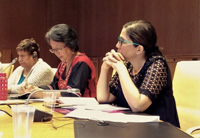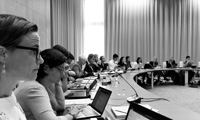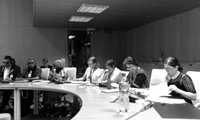Summary report: Expert Meeting on indigenous persons with disabilities
Issued by
Special Procedures
Published
01 January 1970
Issued by
Special Procedures
Published
01 January 1970
 Indigenous persons with disabilities face exclusion, marginalization and multiple layers of discrimination based on their disability, their ethnic origin and their gender. However, despite higher rates of disability in indigenous communities, little or no attention is given to their situation: in most cases they have no access to the services and the support they need to participate fully in society at large and their own communities.
Indigenous persons with disabilities face exclusion, marginalization and multiple layers of discrimination based on their disability, their ethnic origin and their gender. However, despite higher rates of disability in indigenous communities, little or no attention is given to their situation: in most cases they have no access to the services and the support they need to participate fully in society at large and their own communities.
On 7-8 July 2016, the Special Rapporteur on the rights of persons with disabilities, Ms. Catalina Devandas Aguilar and the Special Rapporteur on the rights of indigenous peoples, Ms. Victoria Tauli Corpuz, co-organized an Expert meeting on indigenous persons with disabilities, with the support of the United Nations Forum on Indigenous Peoples, the International Labour Organisation, OHCHR and the Indigenous Persons with Disabilities Global Network, supported by the International Disability Alliance.
 The Expert meeting aimed to ensure that the existing UN mechanisms and initiatives on disability or indigenous peoples fully include the rights of indigenous persons with disabilities, who stand at the intersection of two historically marginalized social groups. The experts, who included members of the Expert Mechanism on the Rights of Indigenous Peoples (EMRIP), the Committee on the rights of persons with disabilities, indigenous persons with disabilities, and academics highlighted that indigenous persons with disabilities face exclusion, marginalization and multiple layers of discrimination based on their disability, their ethnic origin and their gender. The experts identified community-based approaches as the most adequate framework for the overall inclusion of indigenous persons with disabilities and for the provision of support services. They also discussed existing opportunities to advance the rights of this population group through international processes, such as in the humanitarian context, the climate change agenda, or the implementation of the Sustainable Development Goals.
The Expert meeting aimed to ensure that the existing UN mechanisms and initiatives on disability or indigenous peoples fully include the rights of indigenous persons with disabilities, who stand at the intersection of two historically marginalized social groups. The experts, who included members of the Expert Mechanism on the Rights of Indigenous Peoples (EMRIP), the Committee on the rights of persons with disabilities, indigenous persons with disabilities, and academics highlighted that indigenous persons with disabilities face exclusion, marginalization and multiple layers of discrimination based on their disability, their ethnic origin and their gender. The experts identified community-based approaches as the most adequate framework for the overall inclusion of indigenous persons with disabilities and for the provision of support services. They also discussed existing opportunities to advance the rights of this population group through international processes, such as in the humanitarian context, the climate change agenda, or the implementation of the Sustainable Development Goals.
 Following the meeting, for the first time ever the situation of indigenous persons with disabilities was discussed as a priority human rights issue at the 9th session of the (EMRIP). Read the Information Note for more information.
Following the meeting, for the first time ever the situation of indigenous persons with disabilities was discussed as a priority human rights issue at the 9th session of the (EMRIP). Read the Information Note for more information.
VIEW THIS PAGE IN: